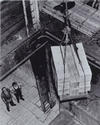 The Second World War changed the international economy and Clyde exports lost their former markets as heavy industry migrated to more enterprising, or low-wage, countries. Only the steelworks offered substantial traditional traffic, chiefly imported coal and iron ore. By the early 1970s over-all trade in goods hovered around 16-18 million tons consisting largely of imported oil (to Fynart terminal), iron-ore and coal. There was some growth in exports of whisky and electronics, but iron and steel was less than 500,000 tons, and shoes, greetings cards and coffee essence were not the stuff of world-class trade. Moreover, the European Common Market did not favour western ports and motorised Scottish trade entered the statistics of English ferry ports.
The Second World War changed the international economy and Clyde exports lost their former markets as heavy industry migrated to more enterprising, or low-wage, countries. Only the steelworks offered substantial traditional traffic, chiefly imported coal and iron ore. By the early 1970s over-all trade in goods hovered around 16-18 million tons consisting largely of imported oil (to Fynart terminal), iron-ore and coal. There was some growth in exports of whisky and electronics, but iron and steel was less than 500,000 tons, and shoes, greetings cards and coffee essence were not the stuff of world-class trade. Moreover, the European Common Market did not favour western ports and motorised Scottish trade entered the statistics of English ferry ports.
 As factories and trades declined, the Upper Clyde docks followed until only Rothesay and George V remained and their exports were almost entirely scrap. In the 1990s steel imports outweighed exports. This was not only a symptom of export failure. The Second World War had revolutionised maritime technology with rapid growth in giant bulk carriers, oil tankers, and container and Roll-on/Roll-off vessels, all beyond the capacity of the river. A deep-water bulk quay at Hunterston did not recapture the old days; intended for the Lanarkshire steelworks, it was by the 1990s devoted chiefly to importing coal.
As factories and trades declined, the Upper Clyde docks followed until only Rothesay and George V remained and their exports were almost entirely scrap. In the 1990s steel imports outweighed exports. This was not only a symptom of export failure. The Second World War had revolutionised maritime technology with rapid growth in giant bulk carriers, oil tankers, and container and Roll-on/Roll-off vessels, all beyond the capacity of the river. A deep-water bulk quay at Hunterston did not recapture the old days; intended for the Lanarkshire steelworks, it was by the 1990s devoted chiefly to importing coal.
 A container terminal at Greenock experienced difficulties because "globalisation", massive costs and computerised loading meant concentration on a few large vessels calling at giant ports, in turn sending smaller "feeder" vessels to second division ports. Glasgow was now in the latter league, unable to retain the loyalty of major lines. In 1966 Glasgow and Greenock were amalgamated as Clyde Port Authority, which was privatised in 1993 and taken over by Peel Holdings in 2003. Attempts are now underway to attract medium vessels to Greenock and giant vessels to Hunterston to join the world-class ports with feeder services to British and Continental ports, but even if this can rival Rotterdam and Antwerp, or even Southampton, Glasgow's own exports now rest on a very flimsy industrial base.
A container terminal at Greenock experienced difficulties because "globalisation", massive costs and computerised loading meant concentration on a few large vessels calling at giant ports, in turn sending smaller "feeder" vessels to second division ports. Glasgow was now in the latter league, unable to retain the loyalty of major lines. In 1966 Glasgow and Greenock were amalgamated as Clyde Port Authority, which was privatised in 1993 and taken over by Peel Holdings in 2003. Attempts are now underway to attract medium vessels to Greenock and giant vessels to Hunterston to join the world-class ports with feeder services to British and Continental ports, but even if this can rival Rotterdam and Antwerp, or even Southampton, Glasgow's own exports now rest on a very flimsy industrial base.